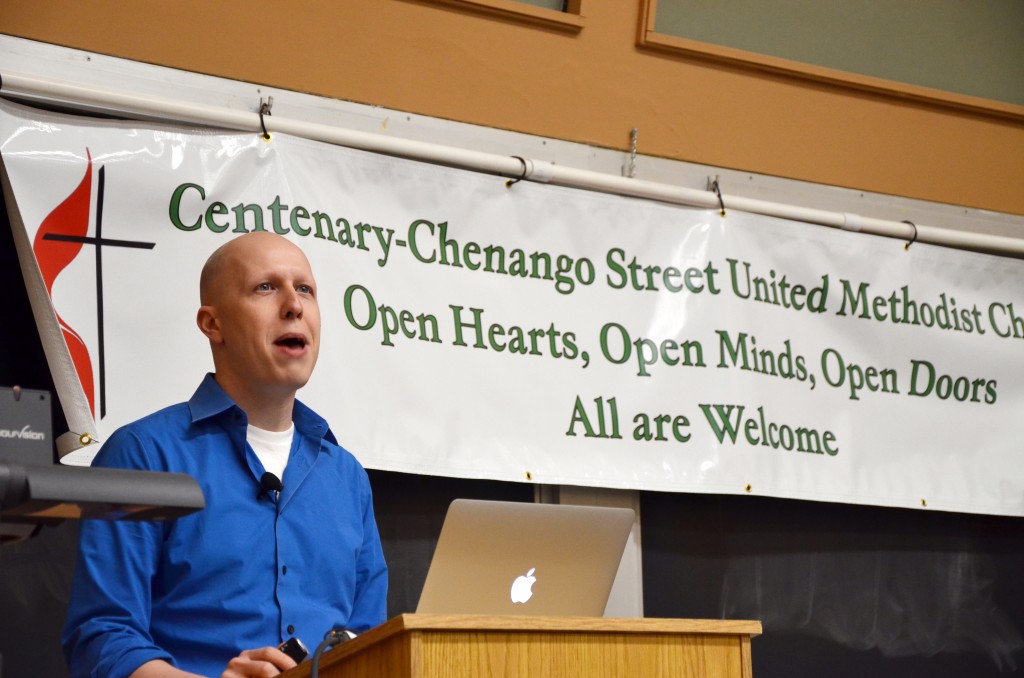
Following an unsuccessful discussion last year, LGBTQ groups on campus invited a gay Christian speaker to discuss how to bridge the gap between the two communities.
The Equality Project, Rainbow Pride Union and SHADES held a talk about how the LGBTQ and Christian communities can effectively engage in dialogue regarding sexual orientation.
According to Angelique Rivera, public relations coordinator of The Equality Project and a senior majoring in psychology, the event was a response to another event last November, where the InterVarsity Christian Fellowship invited SHADES to a discussion about how to reconcile Christianity and homosexuality. When the speakers were revealed to be a formerly gay couple, SHADES walked out feeling attacked.
“We wanted our event to be much more positive and welcoming than theirs,” Rivera said. “We wanted a forum on the bridge between gays and Christians that both conservatives and LGBTQ could feel comfortable voicing their beliefs in.”
Justin Lee, executive director for The Gay Christian Network and author of the book “Torn: Rescuing the Gospel from the Gays-vs.-Christians Debate,” lectured about his transition from believing homosexuality is a sin to accepting it as something unchangeable.
“I grew up at Southern Baptist and got the name ‘God Boy’ for how much I used to preach and follow the Bible. I was always taught that homosexuality was wrong and that gays had a choice to be gay or not to be gay,” Lee said. “I opposed homosexuality as a good Christian until I, in fact, realized that I was attracted to men. So I went to get therapy to stop being gay, but that is not quite what happened.”
According to Lee, groups that exist purely to “help” gay people become straight are all unsuccessful. They cause people to stop identifying as gay but could never end their attraction toward people of the same sex.
“I don’t know how to not be gay, I don’t know how to not be attracted to men,” he said. “I mean, I love women as friends, but I don’t love your boobs. Sorry!”
Lee had four main points on how to have successful dialogue between gays and Christians: agree on what a dialogue is, define your terms, seek first to understand, then to be understood and to share some stories.
“First you have to define what homosexuality actually is. Most LGBT people define homosexuality as being attracted to the same sex while most Christians consider homosexuality to be the actual act of having sex with a person of the same sex,” Lee said. “Once you understand the other side it is easier to speak and cater yourself to their argument. Remember that everybody is the protagonist of their own story.”
Lee ended the event with a Q&A session. One attendee asked Lee how he and his parents dealt with his sexuality once he finally came to terms with it.
“There was a long time that I didn’t answer my parents,” Lee said. “It got to be incredibly difficult but we always kept reaffirming our love for one another, and once we each opened ourselves up to good dialogue, we started to accept each other again.”
Another person asked how conservatives could better relate to the gay community and what language people could use to be more inclusive and less offensive.
“The main point that I want to establish is over the usage of the word ‘gay’ as part of the phrase of ‘gay lifestyle.’ It is offensive to say that there is one ‘gay lifestyle’ because it implies that all gay people live the same way,” Lee said. “I can choose who to have sex with, who to date and who to marry, but I cannot choose who I am sexually attracted to.”


